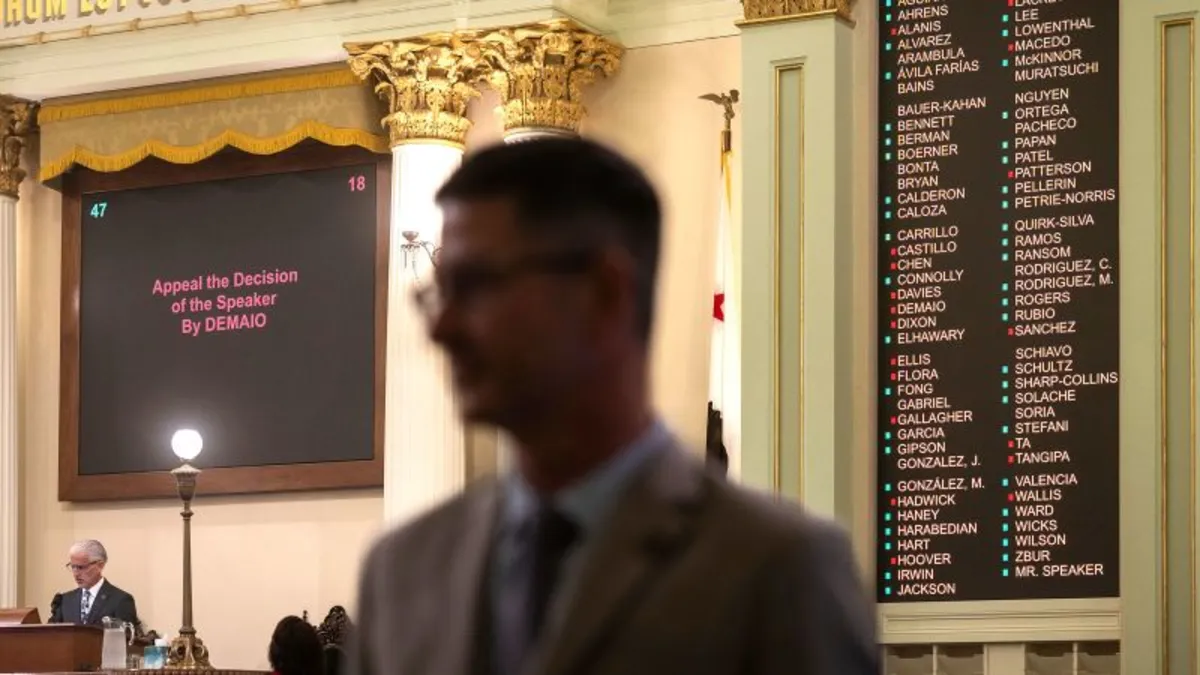
California Democrats are advancing their proposed constitutional amendment aimed at temporarily redrawing the state’s congressional maps. This action comes just hours after Texas Republicans passed similar congressional maps in their House. Following weeks of heated opposition and intense committee meetings, lawmakers in both California and Texas are set to finalize their redistricting efforts on Thursday.
In California, both the state Assembly and Senate will review a trio of bills that aim to pave the way for a special election. This election would allow voters to consider a constitutional amendment that could replace the state’s existing congressional maps, which are set to remain in place until 2030. To proceed, California Democrats face the challenge of convincing voters to overturn the congressional maps that were initially drawn by an independent redistricting commission, a process that began in 2010.
California Democrats have characterized their redistricting initiative as a direct response to the Texas GOP's actions and to former President Donald Trump’s attempts to create a more favorable congressional landscape for the upcoming 2026 midterm elections. Notably, the proposed legislation includes a trigger clause, which stipulates that California will only proceed with redistricting if other states, such as Texas, move forward with their own mid-decade redistricting efforts.
In Texas, the state House approved new congressional maps with an 88-52 vote along party lines on Wednesday evening. This vote followed a 15-day absence of House Democrats, who had fled the state to deny a quorum. The Republican-dominated state Senate is expected to reconvene on Thursday night, where the passage of the redistricting plan is nearly guaranteed. Both parties are aiming to gain five additional congressional seats through these redistricting efforts—California Democrats seeking to secure five more seats, while Texas Republicans have similar goals.
The California legislature will review the proposed referendum and two accompanying bills starting Thursday. All three measures require a two-thirds majority in both chambers to advance. If successful, voters will have the opportunity to decide whether to allow the legislature to amend the congressional lines established by the state’s independent commission, potentially establishing new lines through the year 2030.
The new map proposed by California Democrats is expected to yield five additional seats for the party and stabilize incumbents in more competitive districts. This redistricting proposal was advanced by the appropriations committees in both the Assembly and Senate on Wednesday. However, Republican members expressed concerns regarding the financial implications of the special election, which an analysis estimates could cost “likely in the low hundreds of millions of dollars.”
Democrats argue that this cost is justified to counter the Texas plan, which they assert is being driven by Trump’s influence. State Senator Sabrina Cervantes pointed out the financial comparisons to the Republicans’ unsuccessful attempt to recall Governor Gavin Newsom in 2021, stating, “The costs are going to be just as much as the failed recall that your party placed on Governor Newsom.”
As for Texas, the state Senate's reconvening on Thursday evening will likely result in the approval of the redistricting plan that has already passed the House. Once approved, the plan will be sent to Governor Greg Abbott for final approval. House Speaker Dustin Burrows hailed the passage of the new maps as “ushering in a new chapter of Republican unity.”
Democratic lawmakers, however, have indicated plans to challenge the new congressional maps in court. “This fight is far from over,” stated House Democratic leader Gene Wu. “Our best shot is in the courts.” During this ongoing special session, lawmakers will also consider measures to impose penalties on legislators who intentionally miss sessions.
Nationally, Democrats are rallying behind Governor Newsom’s redistricting push. Former President Barack Obama publicly endorsed this initiative, emphasizing his opposition to gerrymandering while acknowledging the need for California to respond effectively to Republican maneuvers. “If we don’t respond effectively, then this White House and Republican-controlled state governments all across the country, they will not stop,” he remarked during a recent event.
Democratic leaders held a press call where they connected the redistricting efforts in California to broader party strategies aimed at countering the Trump administration. Democratic National Committee Chair Ken Martin noted, “Gov. Newsom didn’t care whether folks would clutch their pearls when he decided to fight fire with fire and level the playing field.” He emphasized that this redistricting battle signifies a pivotal moment for Democrats to engage with voters nationwide.